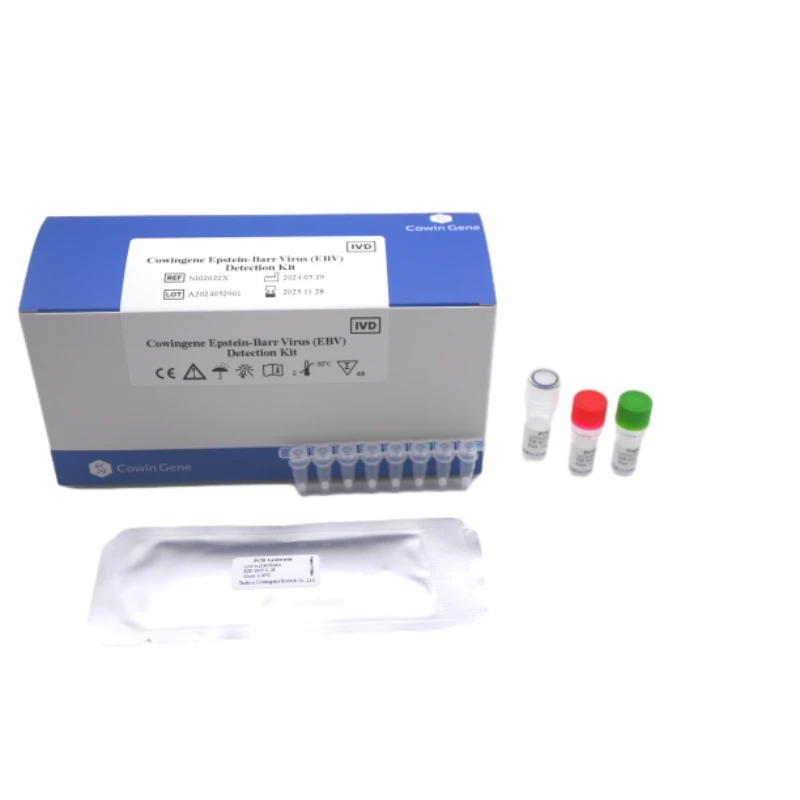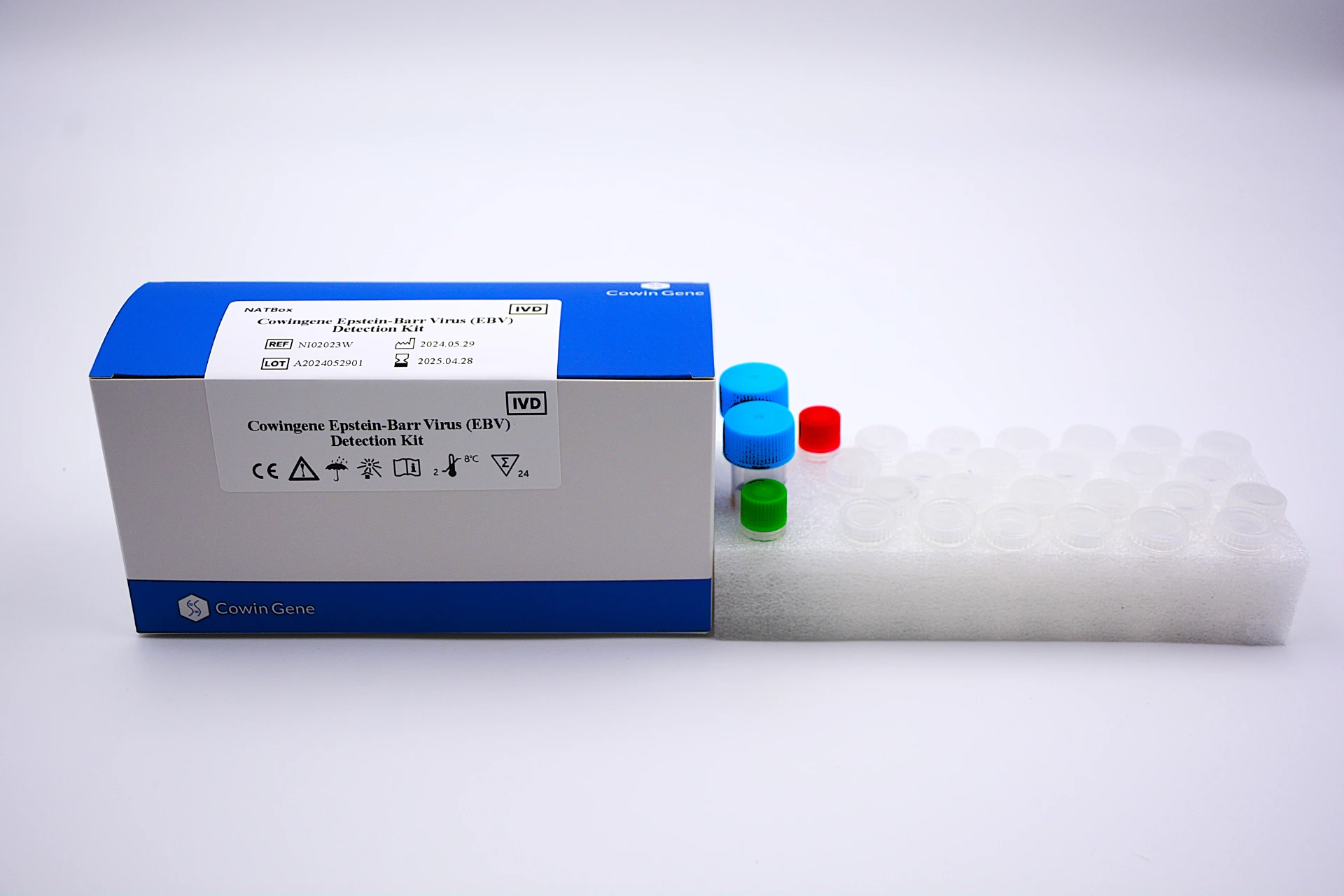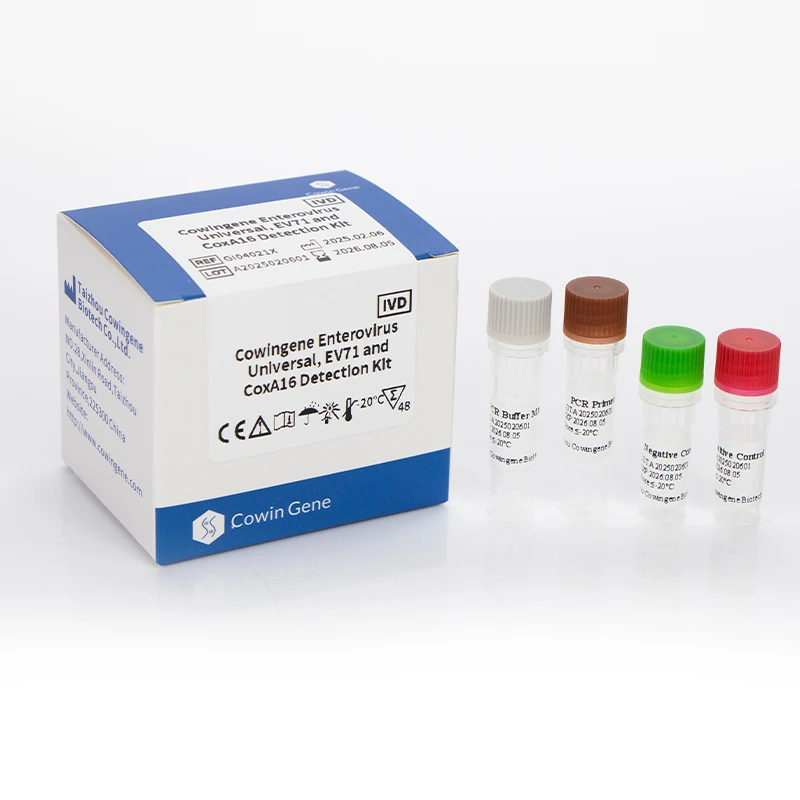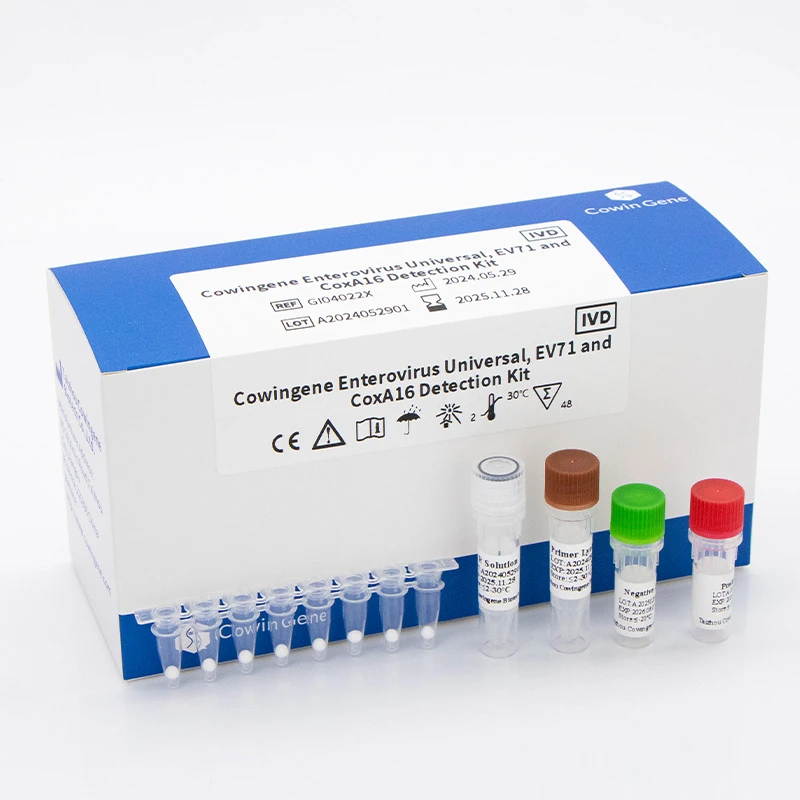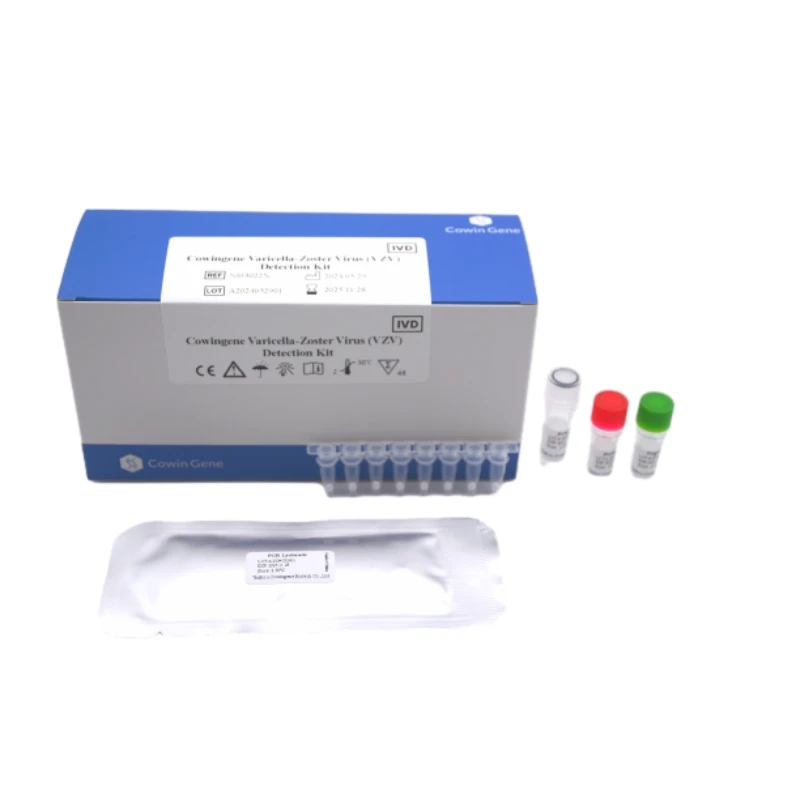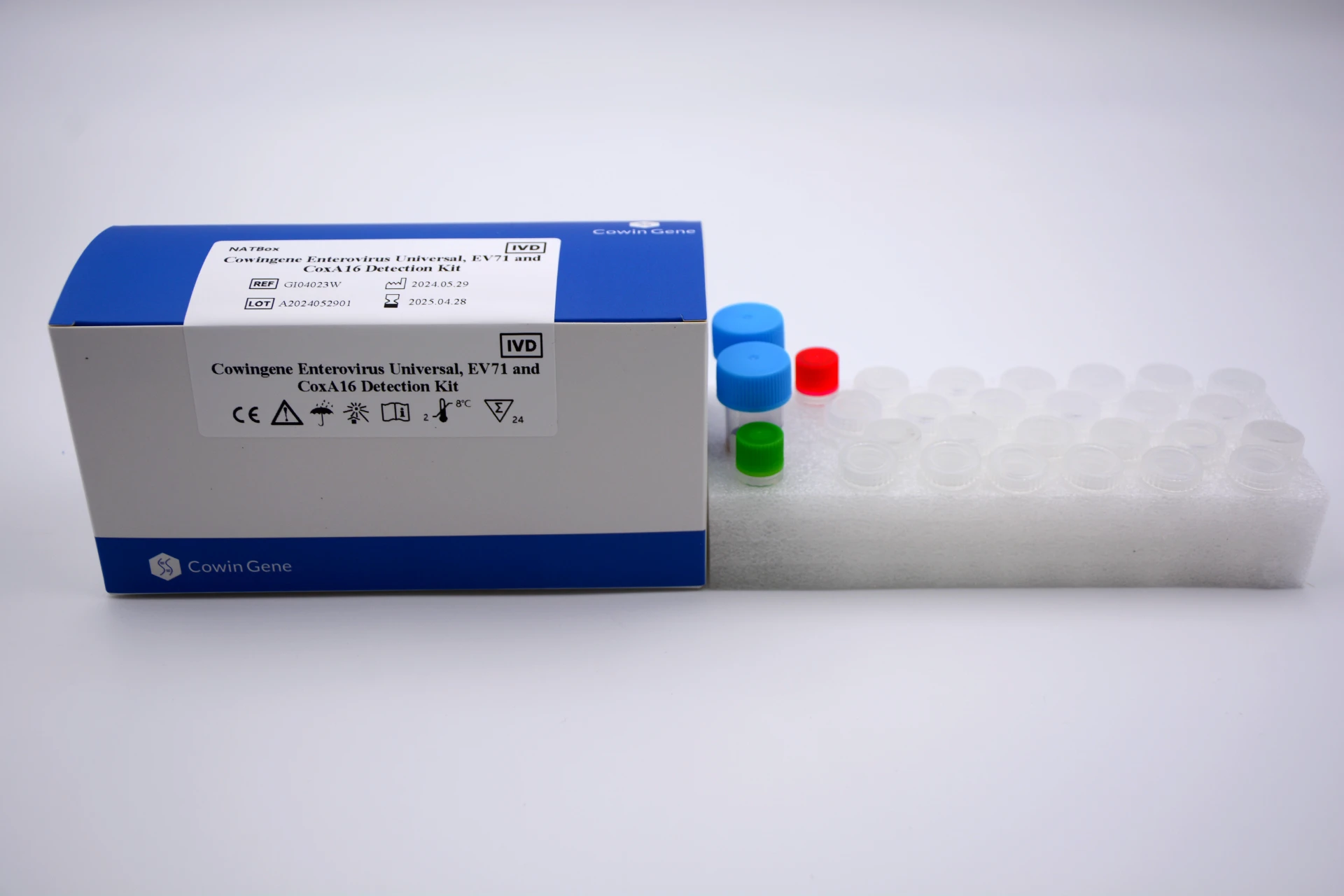Вер . 01, 2025 05:40 Back to list
Accurate CMV DNA Quantitative PCR Test for Viral Monitoring
Introduction to CMV DNA Quantitative PCR Testing
Cytomegalovirus (CMV) infection poses significant health risks, particularly in immunocompromised individuals such as organ transplant recipients, HIV/AIDS patients, and newborns with congenital infections. Accurate and timely detection, along with monitoring of viral load, is critical for effective patient management and treatment. The gold standard for this diagnostic approach is the CMV DNA quantitative PCR test.
This advanced molecular diagnostic technique provides highly sensitive and specific quantification of CMV DNA, enabling clinicians to assess disease activity, predict risk of progression, and evaluate antiviral treatment efficacy. The technology's precision offers an unparalleled advantage over traditional serological or culture-based methods, which often lack the necessary sensitivity or rapid turnaround required for critical clinical decisions. Our focus here is on understanding the intricate details of this vital diagnostic tool, from its manufacturing to its diverse applications.
The Manufacturing Process of CMV DNA Quantitative PCR Kits
The production of a high-quality cmv dna quantitative pcr test kit is a complex, multi-stage process demanding stringent quality control and adherence to international manufacturing standards like ISO 13485 for Medical Devices. This ensures the reliability, reproducibility, and sensitivity essential for clinical diagnostics.
1. Component Sourcing and Purification:
- Oligonucleotide Synthesis: Primers and probes, critical for specific DNA amplification and detection, are custom-synthesized. This involves phosphoramidite chemistry on automated DNA synthesizers. Each batch undergoes rigorous purification (e.g., HPLC) and quality assessment (e.g., mass spectrometry, UV spectrophotometry) to confirm sequence fidelity and purity.
- Enzyme Production: DNA polymerase (typically a hot-start Taq polymerase) is recombinantly produced and highly purified to ensure optimal activity, stability, and lack of contaminating nucleases. Reverse transcriptase, if RNA targets are included, undergoes similar purification.
- Nucleotide & Buffer Manufacturing: Deoxynucleotide triphosphates (dNTPs) and proprietary reaction buffers are synthesized and formulated to maintain optimal pH, ionic strength, and enzyme activity, minimizing PCR inhibition.
- Control Materials: Precisely quantified synthetic DNA or inactivated viral particles serve as positive controls (calibrators) and internal controls. These are manufactured with known concentrations to establish standard curves and monitor assay performance.
- Consumables: PCR tubes, plates, and tips are typically manufactured via injection molding of medical-grade polypropylene, ensuring minimal adsorption of reagents and absence of PCR inhibitors. These materials are certified DNase/RNase-free.
2. Reagent Formulation and Blending:
Individual components are precisely measured and blended in controlled environments (e.g., ISO Class 7 cleanrooms) to create master mixes. This process involves sophisticated liquid handling systems to ensure batch-to-batch consistency and accuracy of concentration. Proprietary stabilizers are often added to enhance shelf-life and thermal stability.
3. Lyophilization or Liquid Dispensing:
Depending on the kit design, reagents may be dispensed as a liquid into individual tubes or plates, or lyophilized (freeze-dried) for enhanced stability during transport and storage, extending the service life significantly. Lyophilization involves controlled freezing and vacuum-induced sublimation to remove water, leaving behind a stable, solid pellet. Both processes utilize automated, high-precision dispensing systems to ensure volumetric accuracy.
4. Quality Control and Validation:
Each manufacturing lot undergoes extensive quality control (QC) testing. This includes:
- Analytical Sensitivity (LOD): Determining the lowest detectable concentration of CMV DNA.
- Linearity and Dynamic Range: Verifying accurate quantification across a broad range of viral loads.
- Specificity: Confirming no cross-reactivity with other human pathogens or host genomic DNA.
- Reproducibility: Assessing consistency within and between manufacturing batches, and across different instruments/operators.
- Stability Testing: Accelerated and real-time stability studies to determine product service life and recommended storage conditions.
- Contamination Checks: PCR-based tests for absence of bacterial, fungal, or human DNA contamination.
All kits must meet stringent internal specifications and comply with relevant testing standards (e.g., CLSI guidelines, IVDR). The target industries for these kits are primarily clinical diagnostics, transplant centers, research laboratories, and public health institutions, where precision and reliability are paramount.
Technical Specifications and Performance Parameters
The performance of a cmv dna quantitative pcr test is defined by several critical technical parameters, which dictate its clinical utility and reliability. Understanding these specifications is essential for laboratories selecting an appropriate diagnostic solution.
| Parameter | Description | Typical Specification |
|---|---|---|
| Limit of Detection (LOD) | The lowest concentration of CMV DNA that can be reliably detected (typically >95% probability). | 100-200 copies/mL (varies by sample matrix) |
| Linearity Range | The range of viral concentrations over which the test provides accurate and proportional quantification. | 10^2 to 10^8 copies/mL |
| Analytical Specificity | Ability to exclusively detect CMV DNA without cross-reacting with other viruses or human genomic DNA. | No cross-reactivity observed with common pathogens (e.g., HSV, EBV, VZV, BKV) |
| Reproducibility (CV%) | The consistency of results when the test is performed multiple times under the same conditions. Expressed as Coefficient of Variation. | |
| Dynamic Range | The total span of concentrations from the LOD to the highest quantifiable limit. | 6-7 orders of magnitude (e.g., 10^2 to 10^9 copies/mL) |
| Sample Types Validated | Biological matrices for which the kit has been validated for use. | Plasma, whole blood, urine, CSF, BAL fluid |
Understanding these parameters is critical for interpreting results and ensuring appropriate clinical action. The high sensitivity and broad dynamic range characteristic of modern qPCR assays allow for the detection of very low viral loads and accurate quantification across the spectrum of infection, from early asymptomatic viremia to high-level disease.

This image illustrates a typical laboratory setup or a visual representation of the PCR process, underscoring the advanced instrumentation involved in performing a quantitative PCR test. Such setups are optimized for high throughput and precision, central to robust diagnostics.
Application Scenarios and Target Industries
The utility of the cmv dna quantitative pcr test extends across various critical medical and research domains. Its precision and sensitivity make it indispensable for monitoring CMV infections, which can have severe consequences if left unchecked.
Clinical Diagnostics:
- Organ and Hematopoietic Stem Cell Transplant Recipients: These patients are highly susceptible to CMV reactivation due to immunosuppressive therapy. Regular monitoring of CMV viral load allows for pre-emptive therapy, reducing the risk of symptomatic disease and graft rejection. Accurate quantification guides treatment initiation, dosage adjustment, and cessation. Specimen collection for a cmv dna quantitative pcr test tube color typically involves lavender-top (EDTA) tubes for whole blood or plasma, ensuring DNA stability and preventing clotting interference.
- HIV/AIDS Patients: CMV retinitis and other end-organ diseases are common opportunistic infections. Quantitative PCR helps monitor disease progression and response to antiviral agents.
- Congenital CMV Infection: Early detection in neonates is crucial for intervention to mitigate long-term neurological sequelae. Testing often involves urine or saliva samples, providing a non-invasive diagnostic avenue.
- Immunocompromised Patients (Non-Transplant): Includes individuals undergoing chemotherapy or receiving biological therapies, where CMV reactivation can significantly increase morbidity and mortality.
Research and Drug Development:
- Antiviral Drug Efficacy Studies: Quantitative PCR is a primary endpoint in clinical trials for new antiviral therapies, measuring the reduction in viral load over time.
- Epidemiological Studies: Assessing CMV prevalence and incidence in various populations, aiding in public health policy and vaccine development efforts.
- Pathogenesis Research: Investigating the mechanisms of CMV replication and disease progression, often requiring highly sensitive and accurate quantification.
The primary target industries are clinical diagnostic laboratories, hospital systems with transplant programs, academic medical centers, pharmaceutical companies, and contract research organizations (CROs). The demand for reliable quantitative CMV testing continues to grow as medical advancements enable more complex treatments and prolonged immunosuppression.
Technical Advantages and Innovations
Modern cmv dna quantitative pcr test kits offer significant advantages over older diagnostic methodologies, driving improved patient outcomes and operational efficiencies in laboratories.
- High Sensitivity and Specificity: Real-time PCR can detect minute quantities of viral DNA, often before clinical symptoms appear, allowing for early intervention. The use of highly specific primers and probes minimizes false positives.
- Quantitative Measurement: Unlike qualitative assays, quantitative PCR provides a precise viral load (copies/mL), enabling clinicians to track disease progression and therapeutic response effectively. This is crucial for guiding "pre-emptive" and "response-guided" therapy strategies.
- Rapid Turnaround Time (TAT): Results can typically be obtained within a few hours, facilitating quick clinical decisions, particularly important in acute patient settings.
- Broad Dynamic Range: Reliable quantification across a wide spectrum of viral loads, from very low to extremely high, without requiring multiple dilutions.
- Automation Compatibility: Many kits are designed for integration with automated nucleic acid extraction and PCR setup systems, reducing hands-on time, minimizing human error, and increasing laboratory throughput.
- Internal Controls: Inclusion of internal controls monitors the entire process, from extraction to amplification, ensuring assay validity and detection of potential PCR inhibitors in the sample.
- Standardization: Efforts towards international units (IU/mL) and WHO standards enhance comparability of results across different laboratories and assays, improving global consistency in patient management.
Continuous innovation focuses on multiplexing capabilities (detecting multiple targets simultaneously), enhanced automation, and integration with complete diagnostic workflows to streamline laboratory operations and further improve diagnostic accuracy.
Vendor Landscape and Comparison
The market for cmv dna quantitative pcr test kits is competitive, with several established manufacturers offering solutions. When selecting a vendor, B2B decision-makers evaluate various factors beyond just technical specifications, including regulatory approvals, support infrastructure, and cost-effectiveness.
Key Considerations for Vendor Comparison:
- Regulatory Approvals: CE-IVD marking, FDA clearance/EUA, or local regulatory approvals are paramount for clinical use.
- Assay Standardization: Adherence to WHO International Standards for CMV DNA (IU/mL) ensures result comparability.
- Automation Compatibility: Integration with existing laboratory automation platforms (e.g., automated extractors, liquid handlers) reduces workflow complexity.
- Sample Versatility: Ability to process various sample types (plasma, whole blood, urine, CSF, BAL) with consistent performance.
- Technical Support and Training: Responsive customer service, application specialists, and comprehensive training programs.
- Pricing and Supply Chain Reliability: Competitive pricing, flexible procurement options, and a robust supply chain to prevent disruptions.
- Kit Configuration: Availability of different kit sizes, pre-aliquoted reagents, or lyophilized formats to suit laboratory needs.
| Feature | Vendor A (Example) | Vendor B (Example) | Vendor C (Example) |
|---|---|---|---|
| Regulatory Status | CE-IVD, FDA EUA | CE-IVD | Local Approval Only |
| WHO Standardized | Yes | Yes | No |
| Automation Compatibility | Open-platform; specific validated systems | Proprietary system only | Manual workflow |
| Sample Types | Plasma, whole blood, urine, CSF | Plasma, whole blood | Plasma only |
| LOD (copies/mL) | 150 | 200 | 500 |
| Kit Format | Liquid, pre-aliquoted | Lyophilized | Liquid, bulk |
Customized Solutions
Recognizing that not all laboratories have identical needs, many manufacturers offer customized solutions for their cmv dna quantitative pcr test kits. These adaptations can significantly enhance workflow efficiency and address specific research or clinical requirements.
- Custom Panel Integration: Developing multiplex panels that include CMV alongside other relevant pathogens (e.g., EBV, BKV, Adenovirus), particularly for transplant monitoring. This optimizes sample usage and reduces turnaround time for comprehensive screening.
- Format and Packaging: Tailoring kit sizes (e.g., 50, 100, 500 tests) or adapting packaging for specific automated platforms. This might include pre-filled reagent plates or tubes compatible with particular liquid handling robots.
- Sample Type Expansion: Validating the assay for less common or niche sample types relevant to a client's specific research or clinical focus.
- Data Analysis Software Integration: Custom development or integration with existing LIS (Laboratory Information System) or LIMS (Laboratory Information Management System) to streamline data reporting and archiving.
- Bulk Reagent Supply: For high-throughput laboratories or manufacturers, providing bulk quantities of master mix or individual reagents.
- Research-Use-Only (RUO) Kits: Offering specialized configurations or targets for research purposes that may not yet have full diagnostic approval.
Collaborating with a manufacturer capable of such customization allows laboratories to optimize their molecular diagnostic capabilities, leading to more efficient operations and enhanced diagnostic precision.
Application Case Studies
Real-world application demonstrates the transformative impact of accurate cmv dna quantitative pcr test results.
Case Study 1: Transplant Monitoring at a Major Academic Medical Center
A leading academic medical center, performing over 500 organ transplants annually, faced challenges with timely and consistent CMV viral load monitoring. Their previous in-house LDT (Laboratory Developed Test) showed variability and required significant manual intervention. After transitioning to a commercially available, CE-IVD certified cmv dna quantitative pcr test kit, integrated with their automated nucleic acid extraction platform, they observed:
- Reduced Turnaround Time: From an average of 8 hours to 4 hours, enabling more rapid clinical decisions.
- Improved Reproducibility: Coefficient of variation reduced by 7% across different operators and shifts.
- Enhanced Sensitivity: Detection of low-level viremia earlier, allowing for pre-emptive therapy initiation in an additional 15% of high-risk patients, preventing progression to symptomatic disease.
- Operational Efficiency: 30% reduction in hands-on time, allowing laboratory staff to focus on other critical tasks.
Customer Feedback: "The transition to the new quantitative PCR kit has revolutionized our CMV monitoring program. The consistency and speed of results are invaluable for managing our transplant patients, leading directly to better clinical outcomes and greater peace of mind for both patients and clinicians." - Dr. Eleanor Vance, Director of Molecular Diagnostics.
Case Study 2: Research into Congenital CMV Screening
A university research group investigating the efficacy of universal congenital CMV screening in newborns utilized a specialized cmv dna quantitative pcr test designed for high-throughput processing of dried blood spot (DBS) samples. This research aimed to identify infected infants early to enable targeted antiviral treatment to reduce long-term neurodevelopmental impairment.
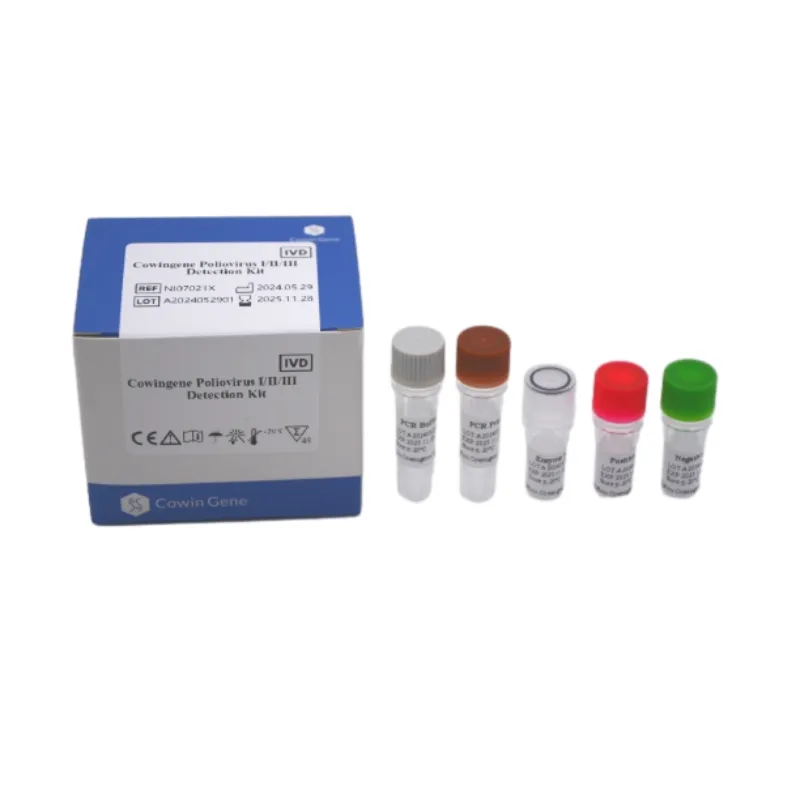
The image depicts the advanced instrumentation or a visual representation of research findings, highlighting the data-driven nature of scientific investigation. The successful implementation of the quantitative PCR assay in this large-scale screening project confirmed its adaptability and robustness across different sample matrices and clinical objectives.
The study successfully screened over 20,000 newborns, identifying CMV-positive cases with high sensitivity and specificity. The quantitative nature of the test was critical in correlating viral load with clinical severity, informing future treatment guidelines. The project demonstrated the feasibility and impact of molecular diagnostics in large-scale public health initiatives.
Addressing Related Testing Needs: EBV DNA PCR Qualitative Test
While the focus here is on quantitative CMV testing, it's important to acknowledge related molecular diagnostic needs. For instance, the ebv dna pcr qualitative test serves a distinct but equally vital role, particularly in immunocompromised patients. Epstein-Barr Virus (EBV) can cause post-transplant lymphoproliferative disorder (PTLD), a serious complication.
Unlike quantitative tests which measure viral load, qualitative PCR tests simply detect the presence or absence of viral DNA. For EBV, a positive qualitative result often triggers further investigation, including quantitative EBV testing, or clinical monitoring, depending on the patient's risk factors. While CMV requires precise quantification for therapeutic guidance, initial EBV screening may utilize a qualitative approach to identify exposure or active infection. Both assays exemplify the power of PCR in molecular diagnostics, adapted for different clinical questions and patient management strategies.
Trust and Support
Frequently Asked Questions (FAQ)
Q: What is the typical turnaround time for an order of a CMV DNA quantitative PCR test kit?
A: Standard lead times for our quantitative PCR kits typically range from 5 to 10 business days, depending on order volume and destination. Expedited shipping options are available upon request.
Q: What is the warranty policy for your diagnostic kits?
A: All our diagnostic kits, including the cmv dna quantitative pcr test, come with a standard warranty guaranteeing performance and stability until the expiration date, provided they are stored and handled according to manufacturer specifications. Detailed warranty terms are provided with each order.
Q: What kind of customer support and after-sales service do you provide?
A: We offer comprehensive customer support, including technical assistance from our team of molecular diagnostic specialists, product training, troubleshooting guides, and online resources. Our dedicated support team is available during business hours to ensure smooth operation and address any queries.
Lead Time and Fulfillment
We prioritize efficient order fulfillment to ensure our clients receive their diagnostic kits promptly. Our robust supply chain and optimized logistics network support global distribution. For custom solutions or large bulk orders, lead times will be discussed and agreed upon during the quotation process.
Warranty Commitments
Our commitment to quality extends to our comprehensive warranty. We ensure that every kit performs to its stated specifications under recommended storage and usage conditions. In the unlikely event of a product defect, our quality assurance team is ready to investigate and provide appropriate resolution.
Customer Support Information
For technical inquiries, ordering assistance, or to request a quote, please visit our website or contact our customer service department directly. Our experts are dedicated to providing timely and effective support to ensure your diagnostic workflows are optimized.
Authoritative Compliance and Certifications
Our commitment to authoritative standards and regulatory compliance underscores the trustworthiness and reliability of our diagnostic products. Manufacturing facilities adhere strictly to ISO 13485:2016, the international standard for medical device quality management systems, ensuring consistent product quality and safety from design to delivery.
Our products often bear the CE-IVD mark, signifying compliance with the European In Vitro Diagnostic Regulation (IVDR), a robust framework ensuring high standards of safety and performance for diagnostic devices within the European Economic Area. We also pursue local regulatory approvals as required in various regions, solidifying our global footprint as a trusted partner.
With over a decade of experience in developing and supplying molecular diagnostic solutions, we have built a network of prestigious partner clients, including major university hospitals, national reference laboratories, and global pharmaceutical companies. Our long-standing collaborations and consistent delivery of high-quality products are a testament to our authoritativeness in the field.
Rigorous internal validation, often exceeding industry benchmarks and CLSI (Clinical and Laboratory Standards Institute) guidelines, combined with extensive external performance evaluations, provides a comprehensive assurance of diagnostic accuracy. This dedication to verifiable data and recognized standards is fundamental to our reputation and client trust.
Conclusion
The cmv dna quantitative pcr test represents a cornerstone in modern molecular diagnostics, offering unparalleled precision, sensitivity, and speed for managing Cytomegalovirus infections. From its meticulous manufacturing process adhering to stringent quality standards to its indispensable role in transplant medicine, congenital screening, and antiviral drug development, this technology significantly impacts patient care and public health initiatives. As the demand for rapid, accurate, and reliable diagnostic tools continues to grow, innovations in quantitative PCR will remain at the forefront, driving advancements in precision medicine and improving outcomes for vulnerable patient populations globally.
References
- Dali, R. et al. (2019). Clinical Utility of Quantitative CMV PCR Testing in Transplant Patients: A Review. Clinical Microbiology Reviews, 32(3), e00057-19.
- Ljungman, P. et al. (2017). Guidelines for the Management of CMV Infection in Patients with Hematological Malignancies and After Stem Cell Transplantation from the European Conference on Infections in Leukaemia (ECIL 7). Leukemia, 31(7), 1475-1486.
- Centers for Disease Control and Prevention. (2022). Congenital Cytomegalovirus (CMV) Infection. Retrieved from cdc.gov.
- World Health Organization. (2018). WHO International Standard for Human Cytomegalovirus (CMV) for Nucleic Acid Amplification Technology (NAT)-based assays. Retrieved from who.int.
- ISO 13485:2016 Medical devices — Quality management systems — Requirements for regulatory purposes. (2016). International Organization for Standardization.
This is the first article
Related PRODUCTS
-
Respiratory Panel Test for Rapid Pathogen Detection
NewsAug.31,2025 -
Accurate Yellow Fever PCR Test Kit: Rapid & Reliable Detection
NewsAug.30,2025 -
Rapid BK Virus PCR: Accurate & Quantitative Diagnostics
NewsAug.29,2025 -
HLA B27 PCR Test Kit: Accurate & Rapid Detection
NewsAug.28,2025 -
Accurate Yellow Fever PCR Test Kits | Fast & Reliable Results
NewsAug.27,2025


